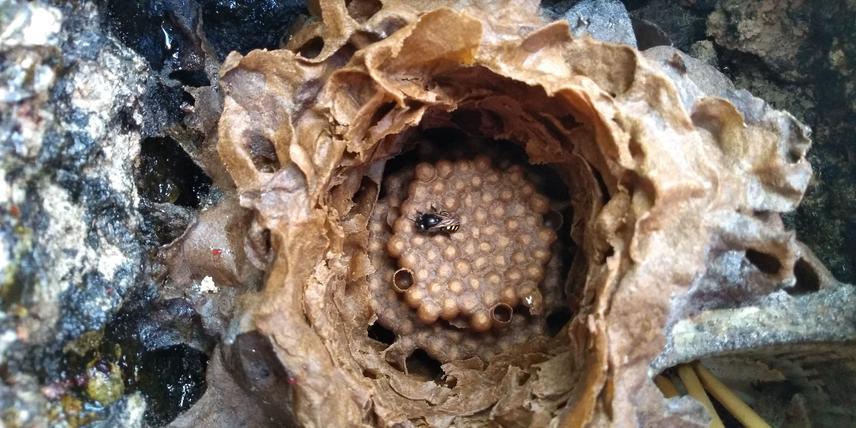Maria Cecilia de Carvalho Silva Ferreira
The aim of this project is to encourage and disseminate sustainable practices in agricultural production looking for conserving biodiversity and increasing the productivity and income of families in the boundaries of The State Park Serra do Rola Moça. To achieve that I am going to (i) quantify the economic impact of the use of wild bees on organic crop production; (ii) incentive traditional activities developed by rural communities; (iii) motivate the use of sustainable agricultural technologies, such as organic agriculture, especially around protected areas; (iv) increase the profit of the activity by introducing the use of wild bees in crop production and (v) as a consequence of all the above, improve land and forest management by farmers for sustainable rural development, reduce poverty, conserving biodiversity and protecting the climate.

Hive on the project meliponary with a worker bee.
Forest habitats suffer from extensive loss and fragmentation worldwide. Cerrado and Atlantic Forest are both considered hotspots and have high priority for the conservation of global biodiversity. Cerrado is the largest and richest Neotropical Savanna and one of the most threatened domains in the world and Atlantic Forest is one of the richest regions in the world in biodiversity, but it is reduced to about 22% of its original cover in different stages of regeneration. The State Park Serra do Rola Moça (PESRM) is considered a Natural Patrimony and is Brazil’s third largest urban park with 3,941.09 hectares. It is situated in a transition zone of Cerrado and Atlantic Forest. Boundaries of protected areas are the element most related to landscape change and function as filters, preventing outside anthropogenic activities from endangering natural ecosystems within protected areas.
Our project intends to investigate if pollination services improve the production of temporary organic crops economically. The experiments will happen in an area of family farmers in the surroundings of PESRM, where we will compare the agronomic yield of crops important for Brazilian economic production. It will be performed in the community level, with the introduction of a non-threatened indigenous specie focus on its use to improve the production of specific crops and as an adaptation of the protocol presented in Vaissière et al. (2011). It was FAO and its partners in colaboration with INRA (Institut National de la Recherche Agronomique, a public research body of the French government) as a contribution to the International Pollinators Initiative (IPI). It was developed for assessing and detecting if a crop production system is suffering a pollination deficit. As the protocol is applied, it will be possible to provide information about levels of pollination deficit in crops important for nutrition and food security.
The information gathered here will be important to promote how significant sustainable activities are for protect natural areas boundaries as well as support the use of pollinator-friendly practices and sustainable use of pollinators for agriculture. It’s essential to stimulate sustainable traditional activities developed by rural communities bordering natural areas. Results from this work should lead to the promotion of innovative forms of landscape management that allow production to be combined with the restoration and conservation of natural resources.